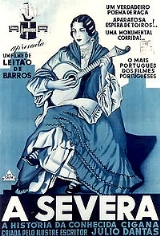
A Severa
Encyclopedia
A Severa is a Portuguese
1931
film, directed by Leitão de Barros, famous for being the first Portuguese all-talking sound film
, a biopic of the fado
singer Maria Severa Onofriana
, known as A Severa, based on the novel by Júlio Dantas
.
The film is rarely seen today, and doesn't have the popularity of other films of the 1930s, seen as the golden era of Portuguese cinema.
Portugal
Portugal , officially the Portuguese Republic is a country situated in southwestern Europe on the Iberian Peninsula. Portugal is the westernmost country of Europe, and is bordered by the Atlantic Ocean to the West and South and by Spain to the North and East. The Atlantic archipelagos of the...
1931
1931 in film
-Top grossing films:-Academy Awards:*Best Picture: Cimarron - MGM*Best Actor: Lionel Barrymore - A Free Soul*Best Actor: Wallace Beery - The Champ*Best Actor: Fredric March - Dr. Jekyll and Mr. Hyde...
film, directed by Leitão de Barros, famous for being the first Portuguese all-talking sound film
Sound film
A sound film is a motion picture with synchronized sound, or sound technologically coupled to image, as opposed to a silent film. The first known public exhibition of projected sound films took place in Paris in 1900, but decades would pass before sound motion pictures were made commercially...
, a biopic of the fado
Fado
Fado is a music genre which can be traced to the 1820s in Portugal, but probably with much earlier origins. Fado historian and scholar, Rui Vieira Nery, states that "the only reliable information on the history of Fado was orally transmitted and goes back to the 1820s and 1830s at best...
singer Maria Severa Onofriana
Maria Severa Onofriana
Maria Severa Onofriana , also known simply as A Severa, is regarded as the first fado singer to have risen to fame, attaining a near-mythical status after her death...
, known as A Severa, based on the novel by Júlio Dantas
Júlio Dantas
Júlio Dantas, GCC was a Portuguese doctor, poet, journalist, politician, diplomat and dramatist.-Biography:...
.
The film is rarely seen today, and doesn't have the popularity of other films of the 1930s, seen as the golden era of Portuguese cinema.

